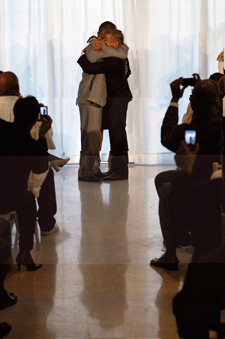Susan Gibbs, spokesperson for the Archdiocese of Washington, recalled weeks of hard discussions leading up to an “extremely difficult decision” to transfer a long-running Catholic Charities foster care and adoption service into the hands of another agency and to cease offering health benefits for spouses to Catholic Charities employees (except for employees who already had such coverage). A District of Columbia council vote in December 2009 to redefine marriage to include same-sex unions had passed its last legal hurdle and went into effect on March 3.
Concerned about remaining compliant with church teaching on marriage, Catholic Charities altered its benefit package to respond to the legal ramifications of the council’s “Religious Freedom and Civil Marriage Equality Amendment,” Gibbs said. She added that Catholic Charities ultimately had little choice in the matter if it wanted to ensure uninterrupted nutritional, health and shelter services to its 120,000 area clients.
Why did events in Washington contrast so sharply with the experience of other dioceses faced by the same conflict between civil and religious interests? It is all in the difference a few words make. Past confrontations over same-sex unions have struggled over the meaning of civil partnerships before the law, not the implications of an extension of the definition of marriage to include same-sex unions. The amendment “requires that we recognize same-sex marriage in our [internal] policies,” Gibbs said, since as contractors with the district, Catholic Charities has to certify compliance with all district laws. “It was really a drastic change for us.” Gibbs added that the archdiocese did not face similar problems with the district’s existing domestic partnership code.
When San Francisco passed an ordinance more than 13 years ago requiring agencies that contract with the city to provide spousal benefits to employees’ domestic partners, then-Archbishop William J. Levada asked for a religious exemption on constitutional grounds. Within a few days, however, the city and the archdiocese worked out a compromise that allowed employees to designate “legally domiciled” members of a household—a dependent parent, child or sibling or an unmarried heterosexual or homosexual partner—for spousal-equivalent benefits without requiring the church to recognize the “partners” as married.
Vermont’s “Act to Protect Religious Freedom and Recognize Equality in Civil Marriage” adds “advantages” and “privileges” to the list of things that religious organizations cannot be required to extend to same-sex married couples. Though its supporters touted the D.C. marriage amendment’s protections for religious freedom, the act offers no exemptions to religious groups outside of the marriage ceremony itself. Churches may not be compelled to conduct same-sex marriage services, nor may they be compelled to allow their facilities to be used for them, but the amendment does not include religious exclusions in all other important practical respects, like employee benefits.
Gibbs sees little likelihood that the D.C. council will change course on the issue and offer religious exemptions in the future. “The council sees it as a discrimination issue,” she said, “and they don’t see any need to compromise.”
And now problems because of same-sex marriage threaten to spill over into neighboring Maryland, where Attorney General Douglas F. Gansler issued an opinion on Feb. 24 that same-sex marriages performed in other jurisdictions could be recognized as legal. The archbishops of Baltimore and Washington and the bishop of Wilmington, Del., both of whose dioceses include parts of Maryland, quickly challenged the opinion, which is not legally binding.








